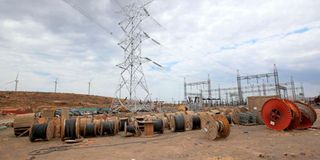Cancelled Ketraco contract to cost taxpayers Sh5 billion

Power lines connecting pylons of high-tension electricity are seen from a substation.
It will cost the taxpayer at least Sh5 billion to offset an arbitration claim after Kenya Electricity Transmission Company (Ketraco) was found at fault for irregularly terminating a contract it had awarded to a foreign company.
The amount is almost a quarter of the annual budgetary allocation to the National Government- Constituency Development Fund (NG-CDF) kitty and is also enough to construct a good 50-kilometre road.
The cancellation has already been flagged by Auditor-General Nancy Gathungu in her report on the accounts of the Energy ministry for the financial year 2018/19, currently before parliament.
The award as at June 30, 2019 also includes Sh835.65 million in accrued interest and Sh102.17 million in legal costs and cost of arbitration incurred by the claimant.
An audit report shows that the Sh5.26 billion tender financed by the African Development Bank (AfDB) loan was awarded to Instalaciones Inabensa SA, a Spanish firm to connect the Kenyan grid to a Ugandan network, and an extension of the Lessos substation in Rift Valley.
The Kenyan project, which has since stalled, was part of the larger contract that involved interconnection of electricity grids to other Nile equatorial lakes countries- Burundi, Democratic Republic of Congo and Rwanda via separate individual loan deals with AfDB.
The interconnection, as per the AfDB document of 2016, was to improve trans-boundary energy exchange among the countries.
Sh2.5 billion
However, in April 2016, Ketraco terminated the services of the contractor over what it termed “non-performance’ stalling the project that was 61 per cent complete. The loan was signed by the government and AfDB on September 20, 2010 and expired on December 31, 2017.
By that time, AfDB had disbursed Sh3.1 billion before the project ran aground. This means the government can only source for the balance from other financiers to complete it.
“No evidence has been presented to show that the loan agreement has been renewed or other source of funds identified. As a result, the status of the project including plans of its revival and completion is not clear,” the audit report reads.
While appearing before the Public Accounts Committee (PAC) of the National Assembly last week, Ketraco managing director Fernandes Barasa said that “we are asking for Sh2.5 billion from the National Treasury to complete the project.”
However members of PAC that are considering the audit report have raised questions over the manner in which the contract termination was done, putting Mr Barasa on the spot.
The documents before PAC show that after the contract was terminated, an arbitration case was instituted in July 2019 and ruled in favour of the contractor.
Ketraco filed an appeal at the High Court to have the arbitral award to Inabensa set aside.
But the High Court delivered the ruling in February 2021 upholding the arbitral award.
Documents before PAC show that the cancellation was done within four days after Ketraco had issued a notice of suspension of the contract.
Persistent failure
The notice was signed by Mr Antony Wamukota, Ketraco project manager, Lessos-Tororo transmission project.
Interestingly, as the termination letter of April 25, 2016 was being issued to Mr Raul Arribas, project manager, Inabensa SA, Mr Barasa had taken a week’s leave.
What drew the curiosity of PAC members led by its chairman Opiyo Wandayi was the fact that the termination letter had been signed by Mr Duncan Macharia as acting Ketraco managing director. “In view of your repudiation of the contract and your persistent failure or inability to execute the contract or provide sufficient material, services or labour, we are now constrained to issue this notice terminating the contract,” Mr Macharia says in the termination letter.
Mr Wandayi and other PAC members Aden Duale (Garissa Township) and Joseph Ngugi (Gatanga) wondered why the termination letter was not copied to the National Treasury, Energy PS and even the Attorney-General.
“From the look of things, this project will cost us a lot than it was envisaged,” said Mr Wandayi.
Ketraco was of the opinion that the decision made by the arbitrator was against public policy and filed an appeal at the Court of Appeal after receiving a go ahead from the Office of the Attorney-General.
Although Mr Barasa said that the office of the Attorney-General, PS Energy and the National Treasury were involved in the arbitration proceedings, he did not provide evidence to the committee to prove his claims.
He did not also provide any proof from the Attorney-General Kihara Kariuki showing that he had sanctioned the appeal with members now curious whether he was deliberately concealing certain information from the committee.





